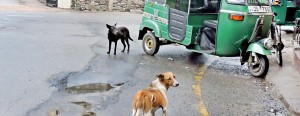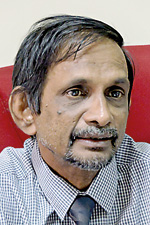News
Hounds to humans ratio rises, with rabies risk
View(s):The dog population has risen to one animal for every 6.7 humans, and a rise in rabies this year makes it necessary to carry out widespread vaccination and sterilisation, health authorities said. There are about 3 million dogs in the country, a fifth of them without owners, Dr Mizaya Cader, Senior Registrar in Community Medicine said.

There are about 3 million dogs in the country, a fifth of them without owners. Pix by Athula Devapriya
Another 30 per cent of dogs are free-roaming domestic dogs found in public places such as religious sites and markets.
Dr. Cader said there was concern over an increase of rabies in this year because 10 deaths had occurred in the past five months while last year there had been 19 deaths from rabies.
“Most of the dog bites are reported without the history of the dogs and the majority of them are identified as street dog attacks. The poor awareness of the community as well as negligence are the main reasons for the increase in rabies,” she said.
She said the government was spending Rs. 350 million a year to treat human patients, Rs. 33m on dog vaccination and Rs. 208m on sterilisation.

Dr. Cyril de Silva
Authorities were working towards immunising 75 per cent of the dog population as well as developing immunity to rabies within the population. The dog sterilisation programme was being carried out with the help of district and regional health officials, local government health officials and along with regional epidemiology unit officials.
Dr. Cader wants pet dogs to be vaccinated and called on owners to stop letting their dogs loose on roads.Colombo National Hospital Deputy Director Dr. Cyril de Silva said more than 27,000 people were treated for dog bites last year at the hospital.
He said that many people who had contracted rabies had been under the influence of liquor and unaware of the dog attack.
Dr. de Silva explained that the human anti-rabies serum was very expensive and only given if there was confirmation that the patient has been bitten by a rabid dog or had bite wounds that cut into veins and nerve-endings in the upper part of the body.
“Rabies is a deadly disease. If untreated, the result is death,” he said. “After the rabies symptoms occur there is no cure.”
Most cases were reported as coming from attacks by unfamiliar dogs, Dr. de Silva said, but added that patients bitten by domestic dogs also often claimed to have been bitten by stray dogs, and because of such misinformation hospitals spent unnecessarily on vaccines and expensive serums.
| Colombo’s 2,000 stray dogs prompt campaign The Colombo Municipal is launching a three-year programme to make city free of rabies following a survey that found there are more than 2,000 stray dogs in the city. The Chief Municipal Veterinary Surgeon of Colombo, Dr. Vipula Dharmawardene, said there were 2,108 dogs roaming in 1,200 streets; 900 of the dogs were female. He said that 99 per cent of the dog population came from street dogs and 99 per cent of them were suspected rabies carriers. Dr. Dharmawardene said according to the Rabies Ordinance and Dog Registration Ordinance every dog owner should vaccinate a pet and obtain a certificate after registration. Local government authorities were authorised to catch roaming dogs and keep them for three days and release them. Due to the no-kill policy brought in by the past government dogs are vaccinated and sterilised before being released. | |

